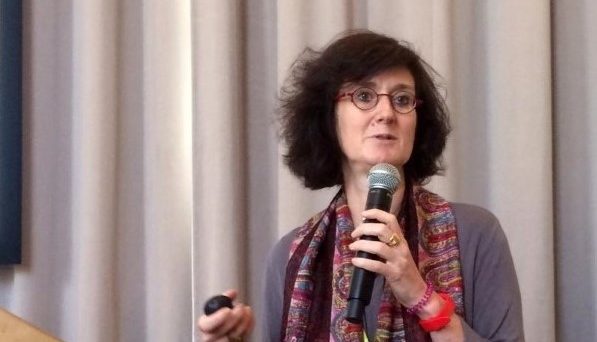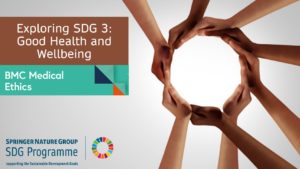
Welcome to our SDG Editorial Board Members blog collection. We are hearing from the Editorial Board Members of the BMC Series journals whose work aligns with achieving the Sustainable Development Goals. Here you can find other posts in this collection, grouped with the tag ‘SDG editorial board members‘.
In this blog, Raffaella tells us more about how her research relates to Sustainable Development Goal 3 – Good Health and Well-being.
I was trained in pharmacy in Italy, and later completed my education itinerary with a PhD in Biomedical Sciences at KU Leuven, Belgium, that has meanwhile become my second home country. Over a 30-year journey, I worked in commercial and non-commercial clinical research, medical humanitarian programs, and academia; and developed strong professional and personal interest for pharmaceutical policies, access to medicines, and research ethics, particularly in relation to resource-constrained settings and vulnerable communities. Herein, I will only focus on the journey through medical research, reflecting on how it fostered my concern for ethics and on how it shaped a part of my research, which is linked to SDG3.8, i.e. the achievement of “universal health coverage”.
At the start of my career, I was a young clinical research coordinator in a pharmaceutical company based and (mainly) operating in the Global North. Later on, after having worked as pharmacist in different humanitarian programs, I became the head of the ITM Clinical Trials Unit, that co-managed collaborative clinical trials addressing the health problems of low- and middle-income countries, in collaboration with local research partners. Observing the world of clinical research from the prospective of the Global North and, some years later, of the Global South, has been a privileged and challenging experience to me. It was immediately very clear, for instance, that in low-income settings prospective participants who do not have a health insurance, will almost inevitably see research participation as a way to temporarily secure free medical care; as such, they will be much more eager to be recruited, and much more at risk of being exploited in non-ethical research. Furthermore, I gradually realized that the concept of “non-ethical research” was much broader and much more complex than what I had learnt from traditional trainings in Good Clinical Practices (GCP) in the ‘90s. By sure, a medical research is unethical if conducted without the approval of an independent Ethics Committee, or without participants informed consent. But is this enough? Can we call a research “ethical” if its governance is not fairly co-owned by the “local” researchers in the study country? Or if it is not accompanied by a meaningful engagement with the concerned community, or with patients’ representatives? Or if there is not a reasonable likelihood that any intervention developed by the research can timely become accessible and affordable in the country(ies) that hosted it? Our group has been documenting the importance of these aspects, and advocated for an update of the international GCP guidelines, which still ignore key-concepts such as fair research partnership, benefit sharing and community engagement (It is time to revise the international Good Clinical Practices guidelines: recommendations from non-commercial North-South collaborative trials – PubMed (nih.gov)).

Research institutions and individual researchers are responsible to build ethics and integrity in their institutional policies and in their personal values and behaviors. Thanks to my experience in two committees that review a lot of collaborative global health research, I understood to what extent the research ethics committees can play a key-role in protecting individuals and communities from unethical research. In particular, they could and should push researchers to incorporate principles such as fair research partnership, benefit-sharing, community engagement, fair policies and practices for sharing research data and biosamples, etc, in their protocols, and in their practices. We joined forces with like-minded researchers to understand how the role of ethics review can be strengthened, particularly during public health emergencies, when reviewers need to reconciliate the quality of reviews with the required rapidity. A lot has been learnt from the experience of the Ebola outbreak in West Africa (https://pubmed.ncbi.nlm.nih.gov/28567113/) – recommendations were published in BMC Medical Ethics https://bmcmedethics.biomedcentral.com/articles/10.1186/s12910-019-0366-x). Last (for now), ethics challenges are nowadays more and more linked also to the post-study phase, when findings should be timely disseminated, without omissions nor inaccuracies or distortions. This pushed us toward analyzing how the research community should engage in responsible dissemination of research, and toward advocating for improved practices, in particular for a correct use of pre-prints (https://bmcmedethics.biomedcentral.com/articles/10.1186/s12910-021-00667-7).
Research ethics remains a rapidly evolving field, that should listen to the voices of all researchers (having in mind the power unbalances that still exist across them in global health research) and to the voices of the communities, for effectively responding to emerging concerns in ethics, integrity and global health. I am more and more persuaded that medical research will not be able to adequately address the global health priority needs and contribute to the achievement of “universal health coverage” (SDG3.8) if it is not ethically sound, from the conceptualization to the dissemination phase.
Comments